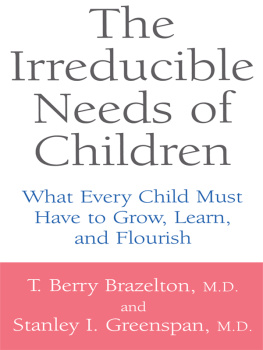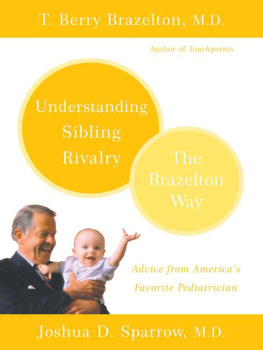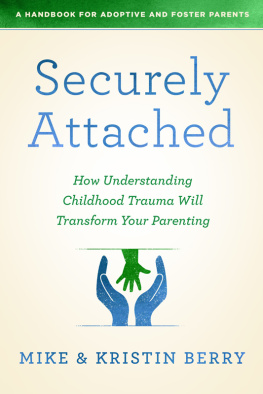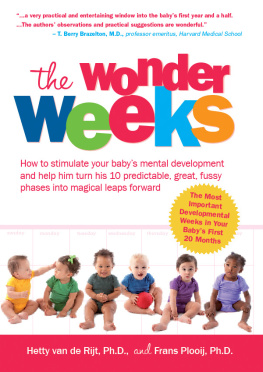T. Berry Brazelton, MD, founder of the Child Development Unit at Boston Childrens Hospital, is Clinical Professor of Pediatrics Emeritus at Harvard Medical School and Professor of Pediatrics and Human Development at Brown University. He is also past president of the Society for Research in Child Development and of Zero to Three: The National Center for Infants, Toddlers, and Families. A practicing pediatrician for more than forty-five years, he introduced the concept of anticipatory guidance for parents into pediatric training. The author of more than two hundred scholarly papers, Dr. Brazelton has written thirty books for both professional and lay audiences, including Touchpoints (translated into eighteen languages), To Listen to a Child, and the now-classic trilogy Infants and Mothers, Toddlers and Parents, and On Becoming a Family. His television show, What Every Baby Knows, ran for twelve years and won an Emmy and three Ace Awards.
To continue his important research and implement its findings, Dr. Brazelton founded two programs at Boston Childrens Hospital: the Brazelton Institute (furthering work with the Neonatal Behavioral Assessment Scale) and the Brazelton Touchpoints Center (training health and child care professionals across the country in the Touchpoints preventive outreach approach).
Among his very numerous awards, he is the recipient of the C. Anderson Aldrich Award for Distinguished Contributions to the Field of Child Development, given by the American Academy of Pediatrics, and the Woodrow Wilson Award for Outstanding Public Service from Princeton University. In 1988, Dr. Brazelton was appointed by the U.S. Congress to serve on the National Commission for Children, and in 2012 he was honored by the White House as a Head Start Champion of Change. Most recently, he received the prestigious 2012 Presidential Citizens Medal, awarded to those who have performed exemplary deeds of service for their country or their fellow citizens.
Most of the people I want to thank are in the chapters of this memoir. All my colleagues at the Child Development Center and the Touchpoints Center have been supportive in the endeavors I have tried to record here.
Among those I would particularly like to acknowledge are my best friend and colleague Joshua Sparrow, who has been my mainstay for twenty-two years now and who will succeed me at the Touchpoints Center, and Kevin Nugent who has been so important in helping get the Neonatal Behavioral Assessment Scale in front of the public. I owe special thanks to Suzanne Otcasek, without whom I could not possibly manage. She helps me with all aspects of the work at the Touchpoints Center. Liz Wilson brought a lot of thought and care to typing the various versions of the manuscript. I am also indebted to my colleague Kyle Pruett and to Michelle Seaton, who read and commented on early drafts of the manuscript. My daughter Christina helped with each stage of the writing and, as always, with so much else.
W aco, where I was born on May 10, 1918, to Pauline Battle Brazelton and Thomas Berry Brazelton, is known as the Heart of Texas. It was a small town in those days, and to the residents dismay, it has stayed a small town. When I was little, Waco had one tall building. I used to dream about it falling on our house and killing all of us. No one could entirely convince me that we were too many blocks away.
There were three distinct social classes in Waco: white, black, and Mexican American. White people owned and ran everything. Black people did all of the domestic work, and Mexican Americans did the rest. The black woman who primarily raised me from age two on was our cook, my beloved Annie May. She had a son my age with whom I was never allowed to play. In our Texas town, there was openly expressed prejudice about how uppity blacks could be. In school black children were treated differently, as if they were expected to fail. As for the Mexican American children, few even got to school. In my memory, those few wore ragged, dirty clothes, and we white children were taught early on to shun them. I remember wanting to play with them and resenting these societal barriers. Looking back I wonder whether part of my lifes work may have been compensation for the deep hurts and prejudices I saw inflicted on many children in this small, ultraconservative town.
My Parents
My father, Thomas Berry Brazelton, was born and raised in Waco. His family owned lumberyards throughout Texas. After attending the Virginia Military Institute for one year, he headed to Princeton. While he was there, he lettered in football, track, crew, and swimming. His real love was diving, and he was an intercollegiate champion at Princeton in 1914.
Dad was a rebel in Waco. Though a member of the conservative city council, he advocated for equal rights for blacks and Mexican Americans. His father, my grandfather Ba, famous as a liberal before him, tried to prevent the lynching of a young black boy who was on trial for allegedly raping a white woman. We were a marked family in a religious, right-wing town. As I remember, when I was in preschool, the Ku Klux Klan burned a cross in front of our house. Dad would disappear because they often came looking for him. Mother would fend them off. Annie May would gather my brother, Chuck, and me and climb under the bed in the back room as if that might shield us.
During prohibition in the late 1920s, Dad also took an independent position. I remember hearing a bang in our cellar as we sat upstairs at dinner. His face paled and he said, Oh my God! Now dont any of you go into the cellar until we hear twenty-nine more bangs. He was making homemade beer, and it was exploding. Dad was high-strung because of hyperthyroidism and had to have his thyroid removed in 1925 by Dr. George Crile in Cleveland, Ohio. Before that he had been terribly difficult to live with. At one point we went to a resort in Arkansas to try to calm him down. Once my father was on medication, he was quiet and subdued, but Mother remained preoccupied by his illness and was often hard to reach. In an effort to make everyone happier, I stole a toy train from a shop to give to Chuck. Mother made me return it and apologize to the owner. I was devastated.
My mother was a gallant and strong-minded woman. Gifted as a pianist, she was sent away to the conservatory in Cleveland and subsequently performed as a solo pianist with the Fort Worth symphony. At some point in her teens she was diagnosed with TB (as were so many in those days) and sent to a spa in Asheville, North Carolina, for the summer. One night while playing the piano, she was approached by my father, then a sprightly Princetonian. Can you play any Gershwin? Back then this was new and daring music. She played for him and their courtship began. Marriage was inevitable. My parents were married in Waco but traveled back to Asheville for their honeymoon. Im told I was conceived at the Manor Hotel in Asheville. Though my father had wanted to settle in New York, having been offered the equivalent of a seat on the stock exchange, his father wanted him to return to Waco to help run the lumber business. In those days, sons and daughters were expected to accept their familys wishes. I am not sure that he ever fully recovered from his longing to be on the East Coast. My mother sensed his anguish at being brought back to Waco and did her best to support him. She gave up her piano for golf. They played together every day. Family meals were about the shots they should have made but didnt. They were both top seeded, so tournaments were the highlights of their lives. Ive hated golf ever since and have never played it.
When I was born during the First World War, my father was away training on the East Coast. I was nine months old when he first saw me. I was told my mother was waiting in a long line at the station, dressed in her best new suit. I was in her arms, probably fingering her nose, her mouth, pulling on her earrings. A long line of uniformed and medaled men came off the train. My father would have come down the platform, half running, in his well-cut uniform with its captains bars. He was handsomenot his face and his prominent nose but in the athletic way he carried himself. Apparently he rushed up, hugging both of us at once and took me abruptly out of my mothers arms. Little Berry! he shouted as he squeezed me in a big hug. As the story goes, I began to cry, louder and louder. What right did this absolute stranger have to take me from my mothers familiar and warm chest? What right did he have to yell at me and squeeze me? Im told I wailed louder and louder, in the chaos of all these reuniting families. My father was no doubt stunned. He doesnt like me! he said to my mother as he handed me back.





